“Boogie Woogie Bugle Boy of Company B”
“Boogie Woogie Bugle Boy of Company B” is the kind of song that makes you tap your feet along to the beat of the music. It also moves the audience, makes you want to grab the hand of a random girl and sway with her. The song is peppy and with an upbeat tune while the Andrew Sisters make it even more lively and happy for its audience.
The Andrew Sisters performed with an enthusiasm and positive national spirit which is significant because America was going through a dark and tough time. Their music gave a sense of familiarity for those who are abroad, Homefront and Warfront. This song also provided a sense of patriotism. The three sisters performed at military posts, hospitals, radio’s, rallies. The sisters performing in these places was a morale booster for the people and the country.
Link : http://https://www.youtube.com/watch?v=8of3uhG1tCI
Lyrics/Music Notes
He was a famous trumpet man from out Chicago way
He had a boogie style that no one else could play
He was the top man at his craft
But then his number came up and he was gone with the draft
He’s in the army now, a blowin’ reveille
He’s the boogie woogie bugle boy of Company B
They made him blow a bugle for his Uncle Sam
It really brought him down because he couldn’t jam
The captain seemed to understand
Because the next day the cap’ went out and drafted a band
And now the company jumps when he plays reveille
He’s the boogie woogie bugle boy of Company B
A toot, a toot, a toot diddelyada toot
He blows it eight to the bar, in boogie rhythm
He can’t blow a note unless the bass and guitar is playin’ with ‘I’m
He makes the company jump when he plays reveille
He’s the boogie woogie bugle boy of Company B
He was our boogie woogie bugle boy of Company B
And when he plays boogie woogie bugle he was buzy as a bzzz bee
And when he plays he makes the company jump eight to the bar
He’s the boogie woogie bugle boy of Company B
Toot toot toot, toot diddelyada, toot diddelyada
Toot, toot, he blows it eight to the bar
He can’t blow a note if the bass and guitar isn’t with ‘I’m
A a a and the company jumps when he plays reveille
He’s the boogie woogie bugle boy of Company B
He puts the boys asleep with boogie every night
And wakes ’em up the same way in the early bright
They clap their hands and stamp their feet
Because they know how he plays when someone gives him a beat
He really breaks it up when he plays reveille
He’s the boogie woogie bugle boy of Company B
Da doo da da doo da da da
Da doo da da doo da da da
Da doo da da doo da da da
Da doo da da doo da da
A a a and the company jumps when he plays reveille
He’s the boogie woogie bugle boy of Company B
The Three Andrew Sister’s
The lyrics speak a story. The story that it tells is a common one, especially during that wartime. In the lyrics, line 4 says, “but then his number came up and he was gone with the draft.” This is significant because it emphasizes the theme of the song and also reveals a subtle message to the audience which is, anyone can be drafted. The lyrics narrate a story of a young boy who was drafted into the military. The tune and the lyrics also present war as something positive thus being a sense of propaganda. The song is probably a pro-war because of the cheery rhythm. In the lyrics line 7, it says “They made him blow a bugle for his Uncle Sam.” Uncle Sam is the national personification of the American government of the United States. His face would always pop up on recruitment posters. As we continue with the lyrics of the song line 15, it is written, “He can’t blow a note unless the bass and guitar is playin’ with ‘I’m” reveals that he cannot play his bugle without the rest of the band. This is to show how that it is a team effort. Without one another it becomes difficult. This is similar to war. Everyone’s effort counts.
The word bugle is repeated throughout the song. Bugle call is a short tune, originated as a military signal announcing scheduled and certain non-scheduled events on a military installation, battlefield, or ship, Historically, bugles, durum’s, or other loud musical instruments were used for clear communication in all the chaos and catastrophe on the battlefield.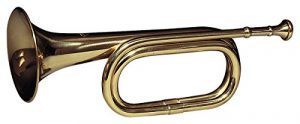
What is surprising about this song is the fact that it has an extremely upbeat tempo for a wartime song. Here they are in 1941 from Abbott and Costello’s Buck Privates. This was a very happy World War II song. It was predated after a year of Pearl Harbor. The song’s message is that the United States Army would welcome all comers.
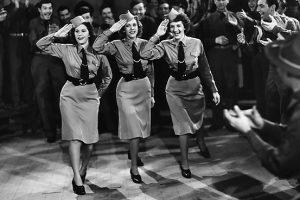 In this image, it gives a vibe of happiness and enjoyment. The men are clapping along and smiling to the ladies performing. The Andrew Sisters are saluting which shows patriotism and support. They are saluting to the men, to show their respect and a thank you.
In this image, it gives a vibe of happiness and enjoyment. The men are clapping along and smiling to the ladies performing. The Andrew Sisters are saluting which shows patriotism and support. They are saluting to the men, to show their respect and a thank you.
The song was written by Don Raye and Hughie Prince. The album is The Andrews Sister in Hi-Fi and released in 1956. The genre of this song is Pop. It was recorded at Decca’s Hollywood studios on January 2, 1941. This was a year before the United States entered World War II. The Andrews Sisters introduced this song. This song, “Boogie Woogie Bugle Boy” was nominated for an Academy Award for best song. There are three Andrew Sisters who sang this song. The first born is Laverne Andrew, who dies at 55, Maxene Andrews, the second born, died at 79 years of age, and Patty Andrews who was born last, was 94 when she died in 2013. The Andrew Sisters have recorded this song with at least three different versions. It has a lasting significance in cultural memory because even Christina Agularia was influenced by this song and sung a song similar to it in 2007. Bette Midler did her own version of the song. There are 17 other versions of different countries.
Along with this historical journey, the song also connects to the type of music that people listened to during that time period. It was a blues while still incorporating Jazz. The word Boogie-Woogie is a musical term that evolved in the late 1920’s. Regardless of the linguistic origins boogie-woogie occurred as a music style for piano. I think the song would have been played in places like a bar, parties, war sites, or clubs because it’s the kind of song that has people snapping their fingers and bouncing around. It creates a perfect environment for lighting up the mood since war is a very emotional and sensitive topic.
Reference
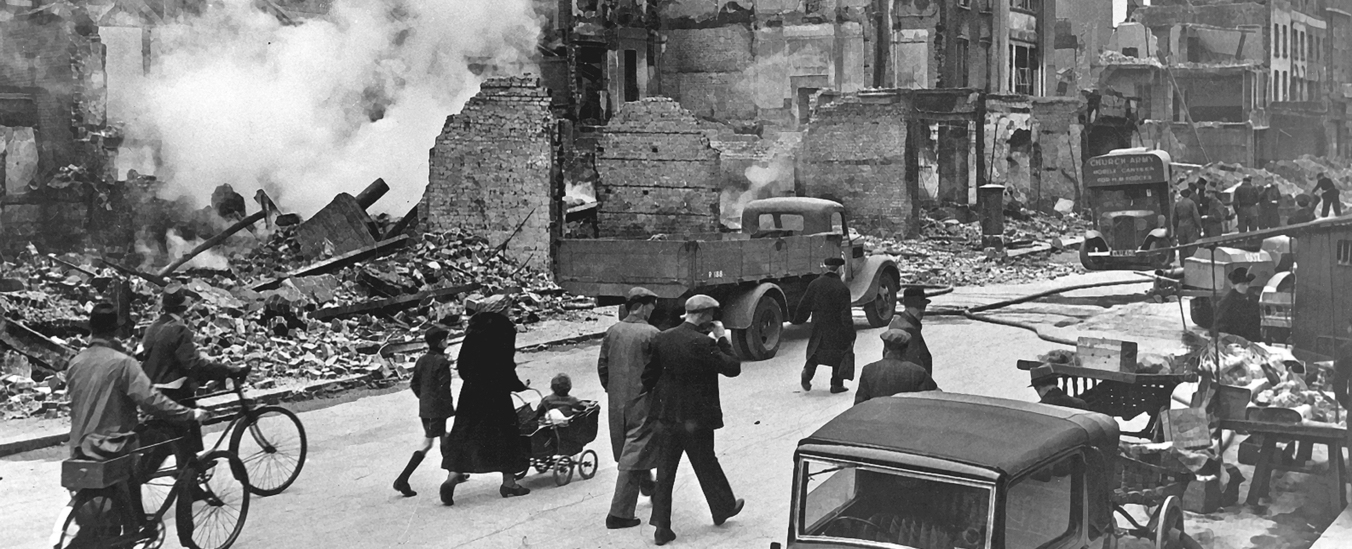



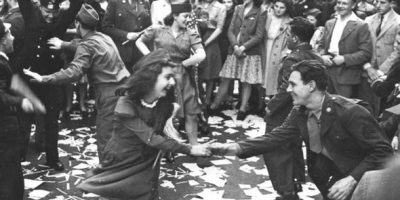
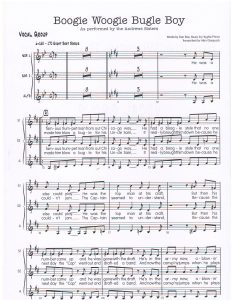


Melissa Dinsman
The new order of this post works much better and I like the close reading you do of the lyrics here as well the discussion of the musical instrument referenced in the song. Do you know if the sisters toured outside the US during wartime? I would expect that they did given their popularity at the time. There are some editing errors that are somewhat glaring that you might want to fix, including the misspelling of “bugle” and “personification.” I also think you want to use the work “peppy” instead of “preppy.” Overall nice work.
Deen Ray
Hi Fahmida
I like your discussion on the liveliness of this particular song. I think this song definitely stands out as having more contemporary elements to it than a lot of the other popular World War II songs. I mean just think of how popular dance songs are today. They bring communities together because everyone knows the songs and we can correlate the lyrics with the choreography. This is much of what The Andrew Sisters did in this song. It’s very refreshing to see.
Jack
Hi Fahmida, one might assume that during World War II there were mainly slow soothing music to listen to; however, this song proves that this was not always the case. In fact, after listening to this song, I instantly felt a burst of liveliness and positive energy. I can imagine the effect that this had on the people of Britain and how it was able to cheer them up. Songs like Boogie Woogie Bugle Boy were needed to boost the morale of the public. It is evident that the Andrew Sisters not only used their amazing voices, but their great dance moves, facial expressions, and glowing energies to appeal audiences and bring that incentive back to the country. This song enables one’s mind to escape from darkness to light.
Tiffany Khan
We actually share the same singers in common for out post. I actually know this song from a vine short, of music over the century. I never really knew what it was about until I did my research on the sisters and their impact on the public especially during that time.